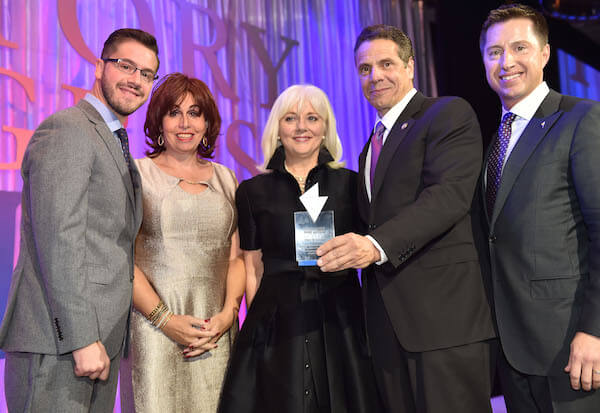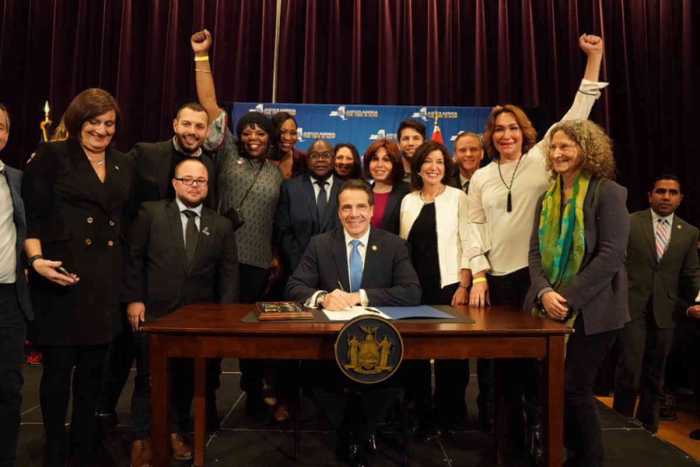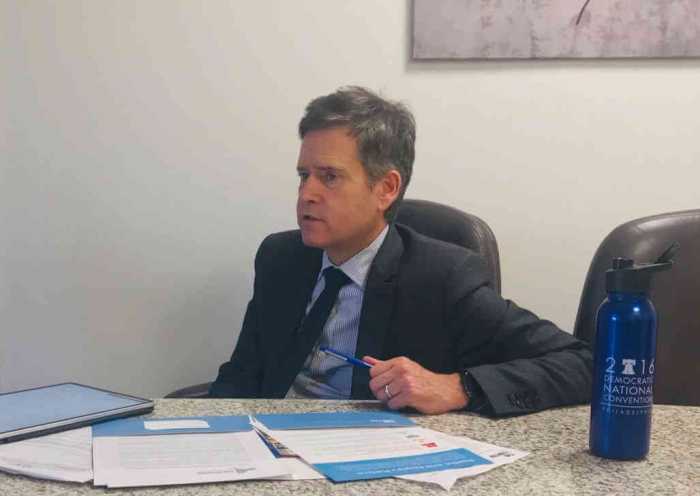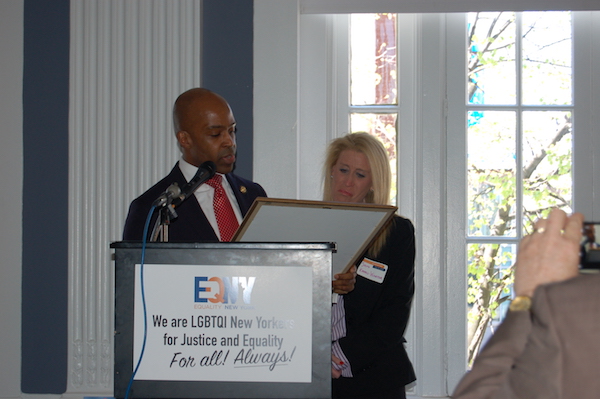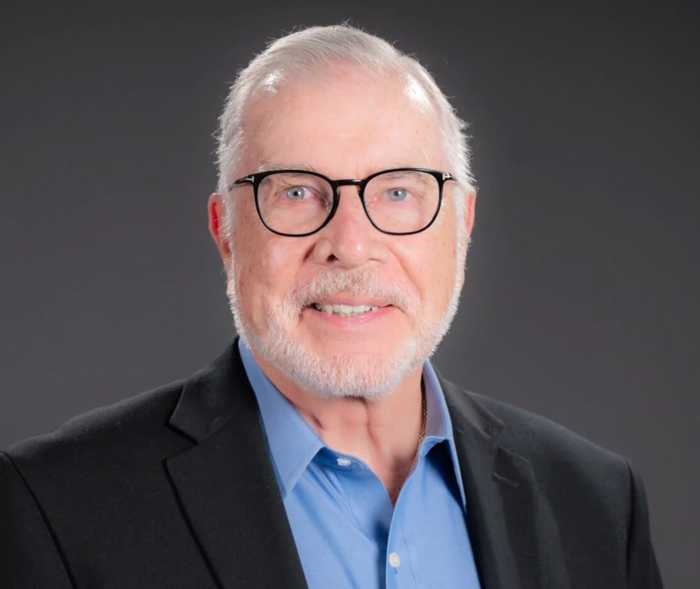Even as New York State adopts new regulations interpreting the Human Rights Law to provide transgender nondiscrimination protections and the city issues a new, stronger guidance on its municipal transgender rights ordinance, 30 activists and advocacy groups from the trans community are taking aim at the Empire State Pride Agenda over its recent announcement that it is winding down major operations “on the heels” of having secured its “top remaining policy priority — protecting transgender New Yorkers from discrimination in housing, employment, credit, education, and public accommodations.”
The victory ESPA was pointing to in its surprise December 12 announcement that it was shutting down was a directive from Governor Andrew Cuomo, unveiled at the group’s annual October Fall Dinner in Manhattan, that the State Division of Human Rights would interpret provisions in the Human Rights Law barring discrimination based on sex and on disability to provide protections based on gender identity and expression, as well. The governor’s action came after nearly 13 years of unsuccessful effort to enact a comprehensive Gender Expression Non-Discrimination Act through the Legislature in Albany.
In a January 5 press release from Juli Grey-Owens, a former ESPA board member who is executive director of the Long Island Transgender Advocacy Coalition (LITAC), she said the letter –– addressed to Pride Agenda executive director Nathan Schaefer –– “criticized Pride Agenda’s failure to fulfill their announced commitment to passage of legislation (known as GENDA) that would have added protections based on transgender status and gender identity to New York Human Rights Law. Specifically, advocates criticize the Pride Agenda for their statement of ‘mission accomplished’ in their press release because of its harmful message that transgender Human and Civil Rights are covered under New York Law.”
Letter from 30 advocates, organization faults “mission accomplished” tone of Pride Agenda bow-out
Other signers of the letter included Kiara St. James, executive director of the New York Transgender Advocacy Group, Staten Island activist Bryan J. Ellicott, Reverend Moonhawk River Stone, another former Pride Agenda board member from Schenectady, Pauline Park, chair of the New York Association for Gender Rights Advocacy, Mel Wymore, an Upper West Side community board member who ran for the City Council in 2013, and the AIDS services group Housing Works.
Referring to Cuomo’s action, which took effect after a 45-day public comment period in late 2015, the Grey-Owens release noted that transgender activists “appreciate the regulations and the protections they will offer,” but argued, “the proposed regulations lack important elements, including the need to openly proclaim that transgender individuals are human beings deserving of equality in Human and Civil Rights; the need for a clear standard of enforcement for businesses and landlords; and the need for a standardized interpretation of case law.”
Of all New York statutes, Grey-Owens noted, only the state’s safe schools Dignity for All Students Act (DASA) specifically defines the transgender community as a protected class. Though the Cuomo regulations provide nondiscrimination protections comparable to what would be offered in GENDA, they do not apply to criminal law sentencing enhancements provided under the state hate crime statute regarding other protected classes.
In a direct challenge to Schaefer and the ESPA board, the advocates’ letter stated, “We would sincerely appreciate a public correction of the impression created by Pride Agenda's press release that transgender equality has been achieved. Transgender equality has not been achieved and transgender advocates will continue to pursue protections under the NYS Human Rights Law. Public acknowledgment from Pride Agenda that New York State needs to pass GENDA would represent a meaningful step to empower the transgender movement, adding to a legacy of securing rights for all.”
In comments to Gay City News several weeks ago, Grey-Owens said that shortly after Cuomo made his remarks at the Fall Dinner, ESPA stopped working with her group and others in a coalition that had been pushing for GENDA in Albany. Shortly thereafter, the remainder of the coalition sent the governor a letter urging him to make the legislation a priority during the 2016 session of the State Senate and Assembly.
In the weeks between the dinner and the December 12 announcement by ESPA, its messaging on GENDA was unclear, though the group suggested it was merely trying to avoid undercutting the significance of the governor’s action by focusing too much attention on legislation that could –– in any event –– not be reintroduced for several months until the Senate and Assembly reconvened.
According to Grey-Owens, her group, LITAC, recently received $15,000 to host five transgender community forums at which the launch of a new statewide group focused on trans-specific concerns would be discussed. On social media, other transgender activists have also called for such a group. Grey-Owens said she welcomes a new broader, LGBT-inclusive group, as well, but said, “I think it’s very important for a trans-driven group to be apart of the discussion. It’s obvious.”
Non-transgender LGBT advocates and allies faced a messaging challenge similar to what ESPA seemed to be going through in the immediate wake of Cuomo’s announcement of the new state regulations, with nobody wanting to be in the position of suggesting the governor’s action did not carry the full weight of law. When Long Island’s John Flanagan, the Republican leader of the State Senate –– which has blocked GENDA’s consideration for years since the Assembly first passed it in 2007 –– faulted the governor for bypassing the Legislature in his action, Democratic Senator Daniel Squadron, GENDA’s lead sponsor, and his out gay colleague Brad Hoylman were quick to respond, as were the Pride Agenda and Gay Men’s Health Crisis.
And Squadron and Hoylman, joined by their Manhattan Democratic colleague Assemblymember Dick Gottfried, the lead GENDA sponsor in his chamber, went on record in great detail lauding the Division of Human Rights’ new regulations in late December in written statements submitted toward the end of the public comment period.
Still, all three Democrats have said over and over again that GENDA is still needed –– with Hoylman and Squadron both expressing concerns about ESPA being missing in action on the issue going forward.
Just as the kerfuffle over ESPA leaving the scene was reaching full boil, the New York City Commission on Human Rights stepped into the debate over transgender equality by announcing several significant updates to its guidance on the city’s 2002 transgender civil rights ordinance. The Commission first issued a guidance on the ordinance in 2005, and the new version is more definitive about the obligations employers, landlords, and business owners have under the ordinance. Where the first guidance stated that employees should allow their workers to dress in accordance with their gender identity, the new policy bars employers from imposing different grooming standards based on gender or sex. The 2005 guidelines pointed to factors that might suggest discriminatory conduct regarding access to single-sex facilities such as bathrooms, while the new policy spells out exactly what is required of institutions that have such facilities. (Among the biggest offenders in that regard, however, have been two public entities –– the Metropolitan Transportation Authority and the Port of Authority of New York and New Jersey, which both at points in the past, though none in the last several years, challenged New York City’s jurisdiction over facilities they maintain.) Employers, landlords, and public accommodations are forbidden from intentionally refusing to use an individual’s preferred name, pronoun, or title. And workplace health benefit programs must, the new guidance makes clear, provide gender-affirming care –– beyond existing federal and state requirements for offering medically necessary transition-related care –– and employers are obligated to offer reasonable accommodations for workers undergoing gender transition.
Civil penalties under the city ordinance can be up to $125,000, unless violations are found to be “willful, wanton, or malicious,” in which case penalties can be twice that level.
The new city guidance was announced with considerable fanfare on December 21, with laudatory comments from Mayor Bill de Blasio, Hoylman, Squadron, and Gottfried, five of the six out LGBT members of the City Council, and the National Center for Transgender Equality, the New York Civil Liberties Union, the Sylvia Rivera Law Project, the LGBT Community Center, and the New York City Anti-Violence Project.

